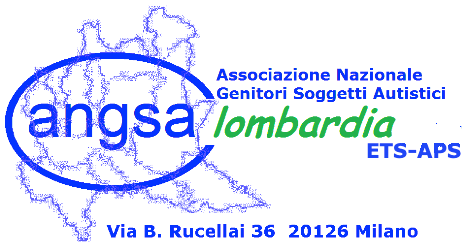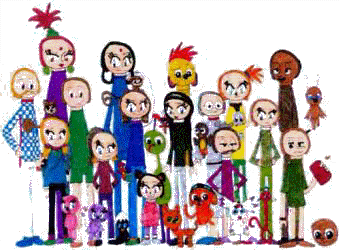National Association of Parents of Autistic People |
|
|
Autism is a chronic developmental disorder, ranking from severe to moderate, which results in any case in a significant lifelong disability. 
Helping the child with autism and his/her parents requires a special effort from the medical and social services.
Autism is different from all other disabilities, and the very characteristics of autism create additional stress for the parents and make the life of the family very hard.
The families left alone to face the stressful challenge of raising a child with autism are from the very beginning the victims of despair and exhaustion because of the misconceptions of autism, of the lack of specialized services, and mainly because of the impossibility of planning for the child's future.Moreover autism is a lifelong condition. This means that persons with autism need a lifelong protection at different levels of help, a lifelong continuity of services specialized in autism and opportunities for living an adult life independently from the family.
1 - SPECIFIC NEEDS LINKED TO THE CHARACTERISTICS OF AUTISM
SOCIAL INTERACTION PROBLEMS
The autistic child's real or apparent indifference towards his/her parents, who have already placed their love and devotion in this small generally beautiful human being, is a true emotional tragedy. The parents feel rejected by their child, who does not respond to them, and yet they do not want to abandon him/her.
The feeling of responsibility for a person who is obviously defenseless against the world and whose suffering they soon start to understand, prompts the parents to search for help in all directions, very often without succeeding in translating the child's affection into emotional participation in family life or into learning social skills.
COMMUNICATION PROBLEMS
Parents quickly notice their child's communication problems, but they often try to quell their fears, clutching at their friends words of consolation or even clutching at would be comforting words of incompetent professionals ("Each child develops at his own rate... There's nothing wrong with him, you're the one who needs to be treated for anxiety..."). Their unsuccessful attempts at rearing the child upset them and poison the family's relationships.
BEHAVIORAL PROBLEMS
Life with a child with autism is very hard. The family's life is soon upset by the autistic child's behavior problems, especially if an aggressive attitude or self-mutilation develops. Often hyperactivity and sleeping or eating disorders compound the behavior problems. Holidays don't exist, falling ill is a luxury, resting is impossible, parents feel crushed with tiredness. Family relationships are soon strained, the child's siblings are or feel neglected as a matter of course. The family lives in a situation of chronic stress that exhausts the endurance of the parents and often leads them to divorce leaving one of them, often the mother, to bring up a one parent family with all that that implies.
ISOLATION
Frequently families themselves must also cope with judgments, criticism, and intolerance of neighbors, friends and relatives, whereas, on the contrary, they greatly need solidarity and support.
The fear and anxiety that are generated by the autistic person's weird and strange behavior, the shame of being considered as incapable parents and the feeling of inadequacy can lead parents to shut themselves up in their home with their child and abandon their child-rearing roles, thereby leading the child into chaos and the family into social isolation.
The results of social incomprehension are all the more devastating when the autistic child is rejected by institutions because of her/his behavior problems or the lack of specialized services.
Indeed, too many children with autism are refused the right of each child to develop her/his potential. Their parents must often apologize for their child's handicap and even beg, as if it were a favor, to get what is an unchallenged right for others.
The mother is often forced to give up working for lack of qualified assistance, and finds herself, little by little, imprisoned with her child with autism in an exclusive relationship. But the love and care of the parents is not enough and does not entitle anyone to deprive their children of their right to adequate care outside their family.
UNCERTAINTY ABOUT THE FUTURE
Too many children and adolescents with autism are excluded from the world of education, even of specialized education, and have no assistance and care except from their families.
The effect of this lack of proper facilities gets worse with the onset of adolescence and adulthood.
The absence of a prospect of a suitable, dignified adulthood, can quickly turn the stress of the family into despair, and there is not a single parent of a person with autism who has not wished to outlive her/his child, to never have to leave the child alone.
This increases the parents' feelings of guilt and powerlessness. Families left without support of specialized services can even lead to a real risk for the autistic person's life.
2. SPECIFIC HELP WHICH IS REQUIRED
PLANNING CARE AND COORDINATING SERVICES' ACTIONS
No person with autism should be deprived of the freedom to develop his or her own way of life in as an independent way as possible.
The future of people with autism depends more on the level of awareness of parents and professionals, on the adaptation of the environment and on the availability of lifelong specialized services than on the severity of their disability.
This obviously calls for co-operation amongst the various services, institutions, and families.
It also requires a political program for autism, to create facilities and continuous lifelong services.
Families need a network of services accessible from the very early years, specific, rigorous, flexible yet consistent.
Family doctors and pediatricians should receive a specific training in order to provide an early screening for the suspected cases of autism. They should be able to refer them to specialized services and to follow-up any examination in case of uncertain diagnosis and or treatment.
The specialized services must be accessible, and provide medical, psychological and educational support, in order to provide from the very beginning a proper diagnosis, a functional assessment and a counseling, training and support at home.
They should provide an early neurological and psychological assessment, and devise with the family a personal education plan. Diagnosis and assessment without any plan or support could drive the family to search for other less reliable solutions.
Services must support the education and social inclusion by providing special education programs and permanent support to the schools, classes or teachers.
Special education must start as early as possible in childhood and must be carried on to adolescence and adult in order to develop and later on maintain personal and social skills, leading to more autonomy and independence.
Adolescents and adults must continue to receive individualized training in functional areas, such as communication, social skills, work skills and behavior, leisure skills, personal autonomy. They need to have access to a suitable job, supported by a permanent counseling (job coach) and competent services in autism, either in a normal or in a protected workshop.
They need also an independent adult life in the community, suitable residential services and facilities and training for a progressive parting from their family. This could be obtained by organizing vacations and week-ends away from the family starting in childhood.
The family's fears confronted by an uncertain future could be dispelled by an early planning of how to take care of the child all day and for the rest of her/his life, even if these early plans have to be modified later on, depending upon the evolution of the child.
The prospects of a dignified future for the child in their homes or in "autistic friendly" institutions also provide a most effective emotional support for parents.
INFORMATION, TRAINING AND INVOLVEMENT IN CARE
"My child doesn't look at me, he doesn't obey, he acts as if we didn't exist, he seems not to care about any of us. How are we supposed to behave?" To this question many professionals answer, "Simply act like parents." But acting like parents of a child with autism is not simple at all.
Parents must receive accurate information on the autistic syndrome as soon as possible so as to understand better how to cope with their child's specific problems.
Today, with what we know of autism, it is even more unacceptable to make the mother feel guilty. Professionals must start by freeing the parents of all guilt feelings and of preconceived ideas on autism.
When the services and facilities do not offer enough information right from the start, the family is forced itself to get information elsewhere, by itself, in order to survive. This can lead to dangerous responses.
On the contrary, once the professionals have informed the family of the characteristics of autism and evaluated the child's abilities, they should be in a position to suggest reliable training material or sessions and refer them to experienced specialized services or agencies and peer groups for on-going support.
It is essential that provision is made for the parents' participation as active partners in the educational plan. The family has a basic role in educating its children and no parent can accept to be a bystander of his child's development.
Getting the family actively involved in a care program increases the child's chances of good development and it is the most effective means of relieving the parents of their feelings of guilt and inadequacy.
The treatment or care program must take account of the in-depth knowledge that any family has of their child, of his/her priorities and lifestyle.
Parents also must receive information on the quality and efficiency of the approaches of various services.
Each service must supply the families with a clear and detailed description of its general approach, and demonstrate its scientific reliability and accreditation.
It also must provide personal plans with concrete, functional goals, and demonstrate their ability to achieve them.
SOCIAL AND EMOTIONAL SUPPORT
Parents urgently need practical answers to their children's right of having an accurate and early diagnosis and assessment, a lifelong education and care and an independent adult life.
Parents of children with autism must be helped to preserve the lifestyle and social contacts they had before their autistic child was born. This means that they must have access to organized services and trained staff in order to keep their jobs and friends, but also to find time to take care of each other and to take care of their other children. Indeed, we must never forget that the family is not spared the problems that any other family has, such as financial difficulties, sickness, and duties toward elderly parents as well as allowing siblings to develop as normally as possible.
Moments of respite give the family a chance to reload their batteries and find new energy to cope with the difficulties of their daily life.
DRUGS
Though at present there is no medicine specific for autism, drugs can sometime improve specific symptoms and the well-being of the autistic person.
Drugs should only be prescribed after every other effort to adapt the environment and personal plan has been unsuccessful, and then only for the benefit of the autistic person. Note that we are not talking here of drugs for specific conditions often associated with autism such as epilepsy or any other specific medical condition that the person may have in addition to autism.
The service prescribing drugs must provide the family with clear and plain information on the benefits and side-effects, and a permanent counseling for families and care-givers.
SCIENTIFIC RESEARCH
Research on genes and toxic or infectious damage that predispose to autism is considered an extremely high priority for the families.
Although parents have reported several different disorders in their children making the behavioral symptoms worse, i.e. allergy or food intolerance, or negative reaction after vaccination, no b consistent findings on the association between autism and metabolic, gastric or immunological disorders has yet emerged in studies on wide autistic populations.
Controlled studies are urgently needed in order to identify the genes that predispose to autism, the influence of early brain damage and the link between biological profiles, cognitive deficits and behavioral features.
Research is also much needed in the field of psychology and education. It is extremely important that we understand better the various cognitive processes which are specifically impaired in autism in order to develop more adapted education strategies and more efficient programs. The development of educational strategies and techniques should also be a subject of applied research.
Given the severity of the impairment, the high intensity of service needed, and the costs (both human and financial), controlled studies are also needed in order to recognize, spread and support effective psycho-educational treatments and comprehensive care models.
(English language material not supplied by ANGSA Lombardia)
Updated on 2/9/2012 |





